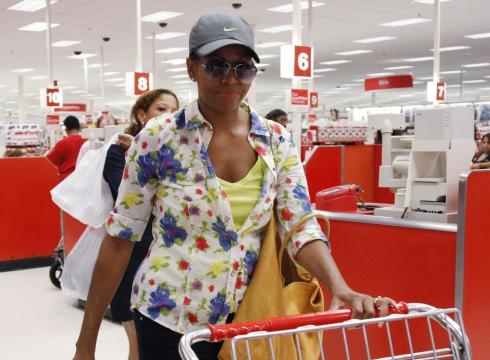Was Michelle Obama the victim of subtle racism during a trip to Target? In a soon to be published interview with People magazine she appears to be claiming she was, but this is at odds with how she previously told the story.
Wednesday, People magazine published excerpts from a forthcoming interview with the Obamas in which they relate their own personal experiences experiences with racism before coming to the White House. President Obama mentions two experiences: Being handed keys at a valet station while waiting for his car and being mistaken for a waiter while at a formal dinner dressed in a tuxedo. For her part, Michelle Obama offers the following example:
I tell this story – I mean, even as the first lady – during that wonderfully publicized trip I took to Target, not highly disguised, the only person who came up to me in the store was a woman who asked me to help her take something off a shelf. Because she didn’t see me as the first lady, she saw me as someone who could help her. Those kinds of things happen in life. So it isn’t anything new.
In the context in which it appears, the First Lady seems to be claiming this incident is an example of racial bias. It comes right after a paragraph in which Mrs. Obama describes her husband’s difficulties getting a cab in Chicago. The very next paragraph describes the interview as touching on “the national discussion of race and racial profiling.”
Of course short people ask tall people (Michelle is 5’11”) for help in stores all the time. This author (6’2″) has experienced it many times. There’s nothing racial or condescending about it. In fact, being asked for help reaching something is really the opposite of belittling them.
As for the First Lady’s experience, it’s important to note that she was dressed down in slacks and wearing a baseball cap and dark sunglasses on her trip to Target. She even pushed her own cart. And when Mrs. Obama told this story on David Letterman’s show, there was no hint of any racial connotation. On the contrary, The First Lady emphasized that the woman who asked was short and simply didn’t recognize her:
I have to tell you something about this trip though. No one knew that was me. Because a woman actually walked up to me, right –I was in the detergent aisle– and she said, I kid you not, she said ‘Excuse me, I just have to ask you something.’ And I thought cover’s blown. She said, ‘Can you reach on that shelf and hand me the detergent?’ I kid you not. And the only thing she said–I reached up cause she was short–I reached up and pulled it down. She said ‘Well, you didn’t have to make it look so easy.’ That was my interaction. I felt so good…She had no idea who I was. I thought as soon as she walked up I looked my–I was with my assistant–and I said this is it. It’s over. We’re going to have to leave; she just needed the detergent.
Is it likely someone could fail to recognize the First Lady? Anyone who has ever watched a segment of Jay Leno’s Jaywalking knowsthat most ordinary Americans are not very familiar with politicians. In this segment, a young woman does recognize a photo of Mrs. Obama but when asked for her name says it’s “Windy.” Add a hat and dark glasses to the photo and chancesare a lot of Americans wouldn’t recognize the First Lady, especially if she was pushing a cart at Target. Really, what are the odds?
It’s possible People has somehow gotten its wires crossed. Perhaps they’ve taken part of the conversation out of its original context in some way that isn’t immediately obvious. But as it stands now, People is framing this as the First Lady’s example of a recent experience with racism. If accurate, this seems a very odd story to present as evidence of racial bias.
Thanks to Jeryl Bier for pointing out the video of the First Lady on Letterman.

COMMENTS
Please let us know if you're having issues with commenting.